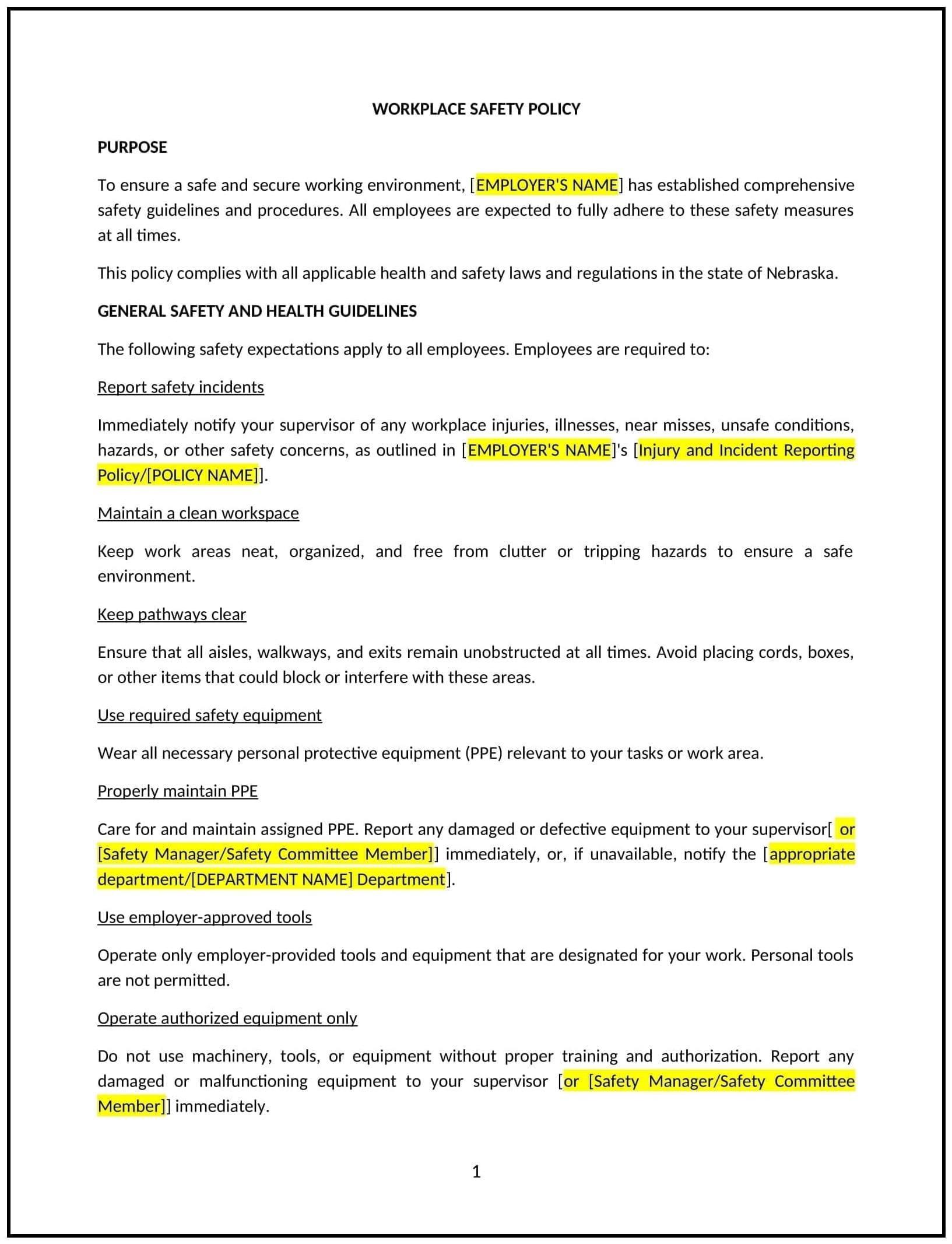Got contracts to review? While you're here for policies, let Cobrief make contract review effortless—start your free review now.

Customize this template for free
Workplace safety policy (Nebraska)
A workplace safety policy helps Nebraska businesses provide a safe and healthy working environment for all employees. This policy outlines the company's commitment to safety, establishes safety protocols, and sets expectations for employees to follow in order to prevent accidents, injuries, and illnesses. It addresses general safety rules, emergency procedures, hazard reporting, and employee responsibilities.
By adopting this policy, businesses in Nebraska can mitigate safety risks, reduce workplace accidents, and foster a culture of safety and awareness, while complying with state and federal regulations.
How to use this workplace safety policy (Nebraska)
- Define workplace hazards: Clearly outline the potential hazards in the workplace, including physical, chemical, ergonomic, and environmental risks. Identify common workplace risks, such as machinery, electrical systems, lifting hazards, or exposure to harmful substances.
- Establish safety procedures: Provide specific guidelines for handling identified hazards. This may include procedures for operating machinery safely, handling chemicals, using personal protective equipment (PPE), and other safety measures designed to minimize risks.
- Set emergency response protocols: Detail emergency procedures for various scenarios, including fire, natural disasters, workplace accidents, or health emergencies. This should include evacuation routes, emergency contact numbers, first-aid procedures, and protocols for reporting incidents to the appropriate authorities.
- Assign safety responsibilities: Designate specific employees or roles responsible for overseeing safety in the workplace. This may include safety officers, managers, or supervisors who will monitor compliance, conduct safety checks, and enforce safety rules.
- Encourage employee participation: Employees should be encouraged to participate in safety programs, report hazards, and actively follow safety protocols. The policy should emphasize the importance of a team-oriented approach to creating a safe work environment.
- Provide training: Regular training on safety procedures should be provided to all employees, including new hires and those who require specialized safety training (e.g., operating heavy machinery or handling hazardous chemicals). This ensures that employees understand their roles in maintaining a safe workplace.
- Outline disciplinary actions for non-compliance: Clearly state the consequences of failing to adhere to safety policies. This may include warnings, mandatory safety training, suspension, or termination, depending on the severity of the safety violation.
- Review and update: Regularly review and update the policy to ensure it reflects the latest safety regulations, workplace conditions, and best practices. This helps keep the policy relevant and effective in preventing workplace accidents and injuries.
Benefits of using this workplace safety policy (Nebraska)
This policy provides several benefits for Nebraska businesses:
- Reduces workplace accidents: By clearly defining safety protocols and promoting awareness, businesses can minimize the risk of accidents, injuries, and illnesses that could affect employees and disrupt operations.
- Improves employee morale: Employees are more likely to feel valued and engaged in a safe work environment where their well-being is prioritized, leading to higher job satisfaction and retention.
- Supports regulatory compliance: A comprehensive safety policy helps ensure that businesses comply with Nebraska state regulations and federal occupational safety laws, reducing the risk of legal action or fines.
- Lowers insurance costs: Businesses with strong safety records may see lower workers’ compensation premiums and insurance rates due to fewer claims and incidents.
- Fosters a positive company reputation: A business that prioritizes employee safety enhances its reputation as a responsible employer and attracts top talent, which contributes to long-term success.
Tips for using this workplace safety policy (Nebraska)
- Communicate the policy clearly: Ensure all employees are aware of the workplace safety policy and its guidelines. Include the policy in employee handbooks, onboarding sessions, and training materials.
- Encourage ongoing safety dialogue: Foster open communication about safety issues by encouraging employees to report hazards and discuss safety concerns with supervisors or safety officers without fear of retaliation.
- Conduct regular safety audits: Regularly assess the workplace for potential hazards and compliance with safety protocols. Schedule routine safety inspections and audits to identify areas for improvement.
- Provide adequate resources: Ensure that employees have access to the necessary safety equipment, such as PPE, first aid kits, and fire extinguishers, and that the equipment is regularly maintained and inspected.
- Monitor safety performance: Track safety metrics such as accident reports, near misses, and compliance with training. Use this data to make improvements to the workplace safety program.